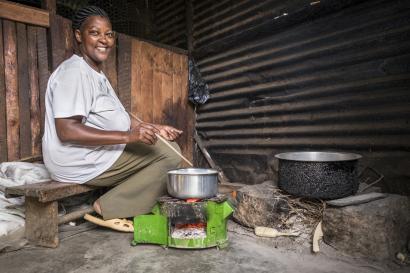Clean cooking

In many low-income countries, communities have no option but to use polluting and harmful fuels burned on inefficient stoves to cook. Approximately one-third of the global population, roughly 2.6 billion people, depends on fuels like wood and charcoal for their cooking and heating needs.
The use of open fires and inefficient stoves not only hampers economic and social progress, but also poses significant health risks. Household air pollution resulting from cooking is responsible for the premature death of millions of people worldwide. The combustion of wood, charcoal, coal and kerosene significantly intensifies global black carbon emissions, contributing to climate change. Women and girls, who primarily bear the responsibility for cooking, are disproportionately affected by these health and economic burdens. Many endure exposure to harmful smoke and spend considerable time and effort collecting cooking fuel.
Recognizing the pressing need for action, we work to stimulate the growth of clean cooking markets and accelerate the transition to more sustainable solutions by cultivating local, supportive ecosystems. This involves several key strategies, including:
- Supporting entrepreneurs and manufacturers to expand the production and retail networks of locally produced cookstoves.
- Creating an enabling environment for clean cooking access in underserved communities.
- Promoting financial inclusion to overcome investment barriers hindering widespread adoption.
- Teaming up with organizations and initiatives focused on accelerating the transition to clean cooking and driving innovation.

Related resources
Ugandan partners to implement clean cooking interventions in Kampala's informal settlements
Fueling a greener future: developing the market for fuel-efficient cookstoves in coastal Kenya
Modern Energy Cooking: Review of the Funding Landscape
Research highlights critical next steps for scaling the clean cooking sector in Rwanda
Clean Cooking: Results-based financing as a potential scale-up tool for the sector